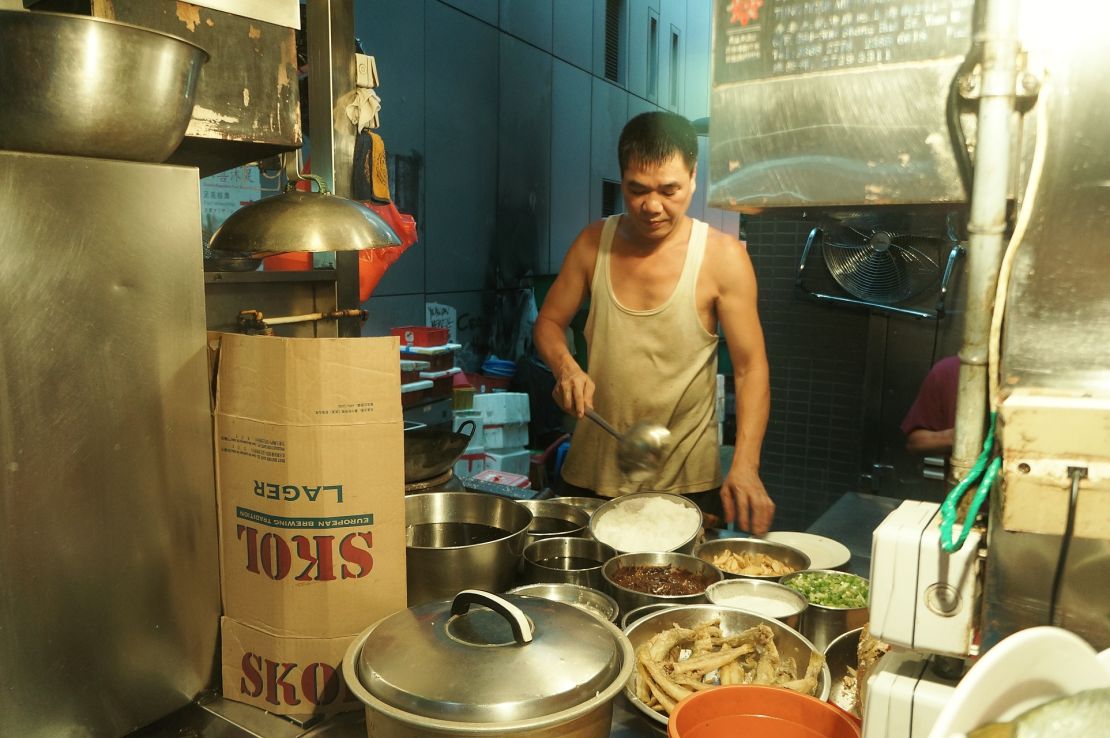Story highlights
Only 28 licensed dai pai dong, or outdoor food stalls, remain in Hong Kong
Dai pai dong famous for Cantonese classics like beef noodles and steamed clams
Government is not offering new licenses, so future of dai pai dong is uncertain
With tanned shoulders and a wrinkled smile, Lam Tse-Sing has the easy demeanor of a guy who knows his job.
For nearly 30 years, he has worked at the same open-air food stall in Hong Kong – known as a dai pai dong – flanked by open flames as he prepares dishes from fried rice to steamed clams.
But Lam, now in his 50s, is one of the last examples of a dying Cantonese culinary tradition.
Decades of urban transformation have decimated Hong Kong’s throngs of dai pai dong, supplanting them with glitzy malls and big name eateries.
According to vendors I spoke to, there were hundreds of dai pai dong in the 1960s.
Today, there are just 28 left.
It’s a shame, says Lam. Modern restaurants have “no culture, no taste.”
Stalwarts stand firm
In Hong Kong’s Central district where skyscrapers crowd out the surrounding sky, Lam’s dai pai dong, named Sing Kee, retains a proud tradition of old-school street life.
On a sweltering weeknight, I sit on a sticky blue plastic stool under a faded red umbrella. Patrons tuck into scrumptious dishes delivered by scrambling wait staff and the sound of hearty chatter mingles with the smell of cigarettes and kitchen grease.
The key to dai pai dong-style cuisine, he tells me, is wok hei, a Cantonese phrase that literally translates to “wok essence” and refers to the distinctive flavor that can only be achieved from a sizzling wok.
By using scorching flames, boiling hot oil and a fast, muscular stir-fry technique that launches the food airborne (Lam sometimes sautés two woks at once), the food is infused with a rich taste that evokes the brash old city.

The stir-fried beef noodles (HK$48) are springy, slick and satisfyingly salty. The grouper filet and seasonal vegetable (HK$54) offer slippery bites of soft, savory fish and bok choy stir-fried al dente in a light sauce.
They all have that home-cooked aroma that would send me running to the kitchen as a kid.
The question is, will Hong Kong’s future children be able to experience dai pai dong cooking?
“It all depends on the government,” explains Lam.
Lack of government support
For years, Hong Kong’s administration has encouraged the decline of dai pai dong, which are viewed by some officials as fire hazards, health risks and public nuisances.
According to vendors, the government has paid hundreds of dai pai dong owners to give up their licenses and no new licenses have been granted in decades.
But locals say more should be done to preserve the tradition.
“The government should protect dai pai dong,” said Yu Tse-Pang, 24, a cashier at a local dumpling restaurant. “They’re friendly, tasty, and cheap. My friends and I eat there all the time.”
Lo Kwan-Sing, 81, agrees. “I don’t know any ordinary citizen who wouldn’t support them. You get more choices and cheaper food. But if you’re a rich guy who eats in hotels all the time, of course you wouldn’t care.”
Despite their popularity, dai pai dong face an uncertain future. Dai pai dong licenses may only be transferred to relatives, but vendors say their children have no interest in continuing the trade.
“They say this work is too difficult, the weather is too hot,” says Lam. “When I pass away, the next generation isn’t going to take over.”
Until then, Lam will continue doing what he does best.
“There aren’t many places that still cook like we do,” he says. “But if you’re someone who knows how to eat, then you’ll know how to appreciate it.”
Sing Kee: 9-10 Stanley Street, Central, Hong Kong








